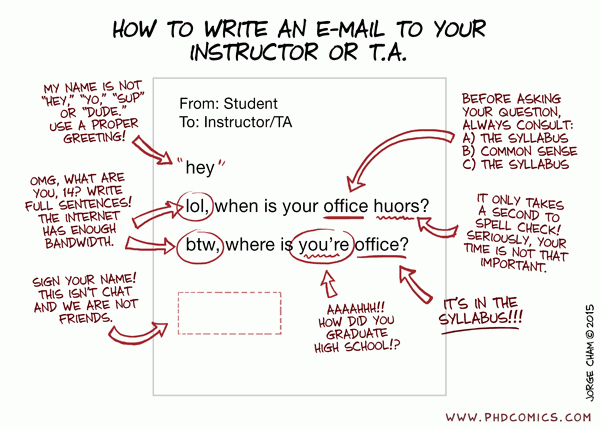
Assistant Professor
Department of Psychology
LaGrange College
Polite Email Etiquette
Professors, like everyone else, have gone electronic. In addition to the one-on-one office hour, they're often willing to communicate by e-mail. Here are some things to consider before clicking the "Send" button:
Subject lines are for subjects. Put a brief explanation of the nature of the e-mail (like "question about paper") in the subject line. Never include demands such as "urgent request—immediate response needed." That's the surest way to get your request trashed.

Salutations matter. The safest way to start is with "Dear Professor So and So". That way you won't be getting into the issue of whether the prof has a Ph.D. or not, and you won't seem sexist when you address your female-professor as "Ms." or, worse yet, "Mrs. This and That."
Signoffs and signatures count. Always end by closing with "Best wishes" or "Regards" (or some other relatively formal, but friendly, closing). And always sign with your (entire) real name, not some wacky nickname like Ry-Ry or Biff.
Always acknowledge. If your professor answers—or send you the handout or reference that you asked for—be sure to tell him or her that you got it. That way he or she will know that you received the reply.
Never ask “Did I miss anything today?” This is rude and implies that it was possible to have learned nothing for an entire class period. If you professor taught a class that day, you missed all of it. If you miss class, contact a classmate to get caught up. Only then should you contact an instructor with specific questions about the missed material.
Clear and concise is best. Your prof might get 25 or 30 E-mails a day, so, it's best if you ask your questions in as focused and succinct a way as possible. (Hint: it's often good to number your questions). And, if your question is very elaborate or multifaceted, it's best to go to an in-person office hour. You'll get better service that way.
This is not Facebook. Don't write the professor in the way you'd write on your friend's wall. Resist the temptation to talk about the "bad ass" paper you need help with, your "loser" TA who didn't teach you what you needed to know, or the "crappy" grade you just got on the midterm.
This is not texting. So pls dun wrte yor profeSR lIk ur txtN. uz abbrz @ yor own rsk. coRec me f Im wrng. (Translation thanks to www.transl8it.com, which features a neat little Facebook widget.)
THIS IS NOT A SHOUTING MATCH. Don't write in all uppercase letters, which is an E-mail convention for anger or other strong emotions. No one likes yelling.
Spelling mistakes make you look like a doofus. So always use the spel check, and proofread yyour e-mail, two.
Don't lay it on too thick. It's one thing to be polite and friendly in your e-mail; it's another thing to wind up with a brown nose.
E-mail is forever. Once you send it off, you can't get it back. Once your professor has it, he or she owns it and can save it or, in the worst case, forward it onto colleagues for a good laugh—at your expense.
Please follow the above guidelines when communicating through email. Failure to do so could lead to me ignoring your message.

